British woman in North Bay, Ont., to learn about her uncle, a Second World War flight instructor
A woman from the United Kingdom is visiting North Bay to learn more about her uncle’s contribution to the war effort and to pay her respects.
Sally Davies is on a mission to learn more about Leslie William Laurence Davies, her uncle who was a Royal Air Force (RAF) pilot and flight instructor in North Bay during the Second World War.
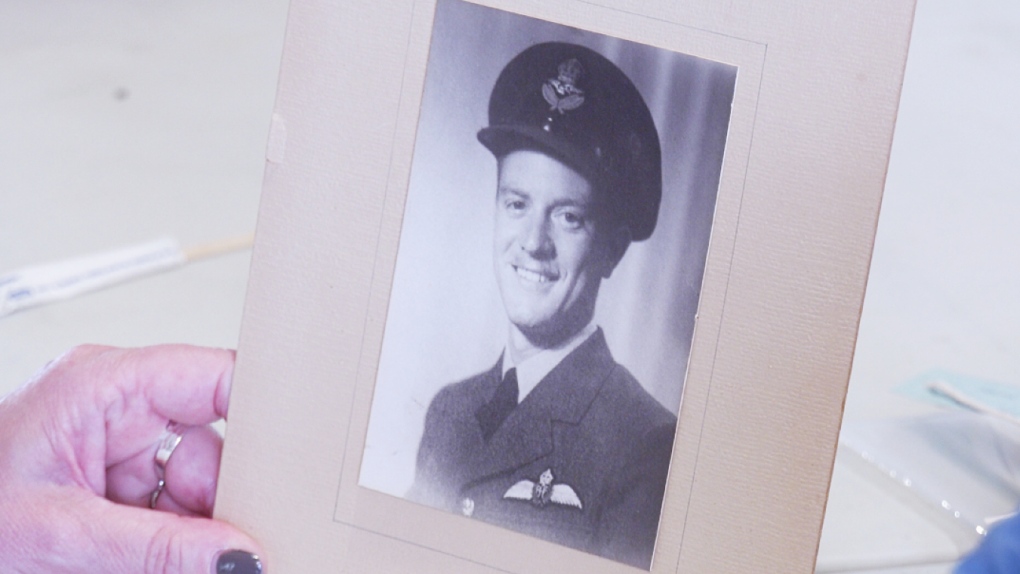 Leslie William Laurence Davies was a Royal Air Force pilot and flight instructor in North Bay during the Second World War. (Eric Taschner/CTV News)
Leslie William Laurence Davies was a Royal Air Force pilot and flight instructor in North Bay during the Second World War. (Eric Taschner/CTV News)
Her uncle, who travelled to the city to train pilots, died in a crash days before the end of the war in Europe.
“I wanted to actually visit his grave here in North Bay and I did to pay homage to my uncle," Davies said.
"So, I sat there and told him all about my family and I, which sounds weird, but it was really peaceful."
Her late father always wanted to visit the city where his brother is buried. During her trip, Davies is meeting with local military historians to learn more about her uncle's contribution.
“There’s so much history there and I don’t want to lose it. If anything, I’d like to keep it here,” she said.
“In some ways, it’s more important to keep it here because this is where my uncle spent his last very happy years of his life.”
Laurence Davies travelled from England and became a flight instructor at a military flying school at the airport.
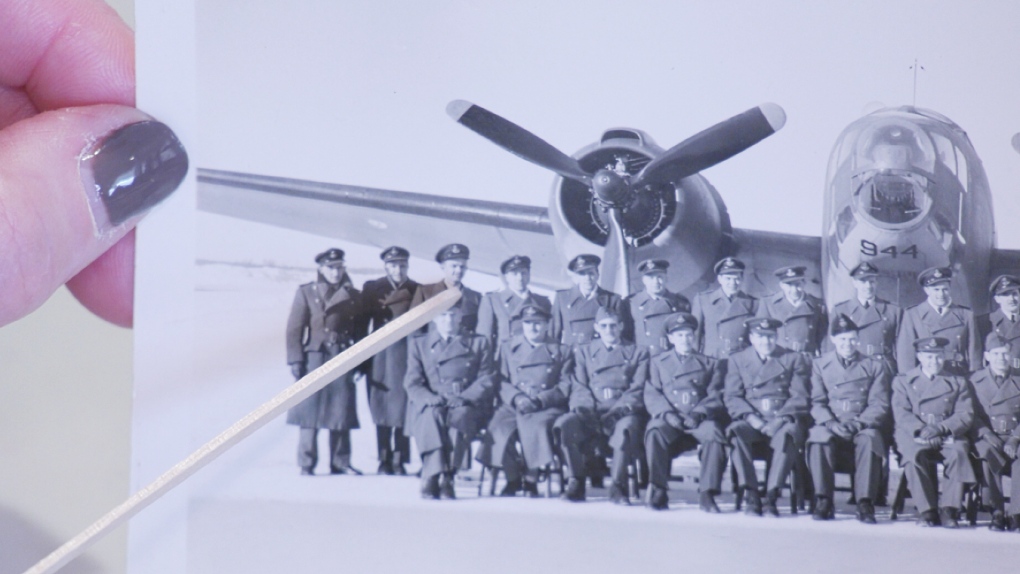 Leslie William Laurence Davies travelled from England to train pilots at the airport in North Bay during the Second World War. (Eric Taschner/CTV News)
Leslie William Laurence Davies travelled from England to train pilots at the airport in North Bay during the Second World War. (Eric Taschner/CTV News)
The school trained Allied fliers from 23 different countries on how to fly across the Atlantic Ocean and join the war effort on the western front.
Before war broke out, the odds of surviving the 16-hour non-stop overseas flight to Europe was two in three.
“Thanks to her uncle and the other instructors, the survival rate went up to nearly 96 per cent,” said retired 22 Wing/CFB Heritage Officer Doug Newman.
The war was coming to an end and the Allied forces were pushing into Nazi Germany.
Laurence Davies was killed during a routine flight on his Mitchell bomber when it crashed on April 28, 1945, about a mile north of the airfield in a heavily wooded area.
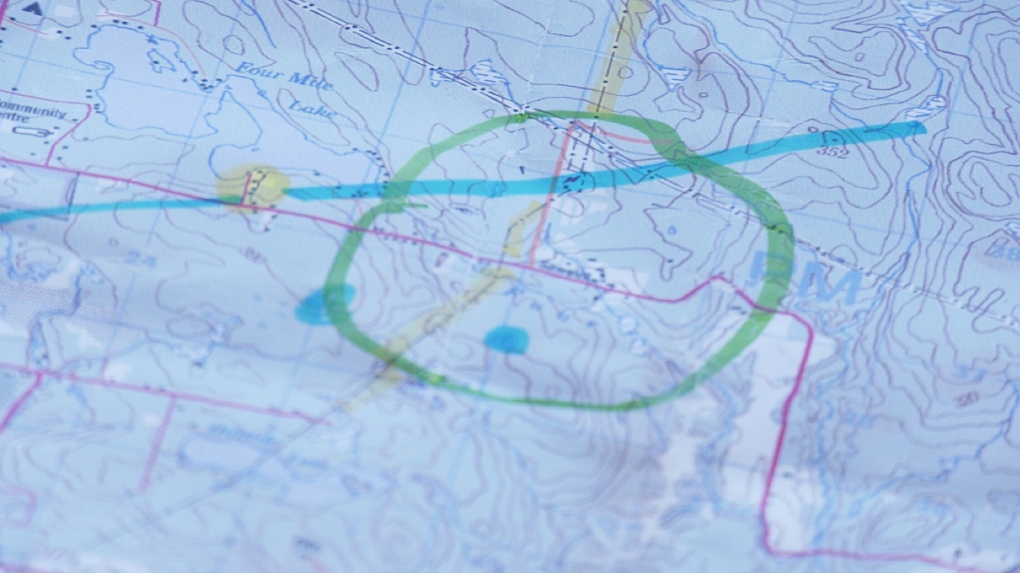 The circled area is where officials believe a bomber flown by Leslie William Laurence Davies, a Royal Air Force (RAF) pilot and flight instructor, crashed on April 28, 1945. (Eric Taschner/CTV News)
The circled area is where officials believe a bomber flown by Leslie William Laurence Davies, a Royal Air Force (RAF) pilot and flight instructor, crashed on April 28, 1945. (Eric Taschner/CTV News)
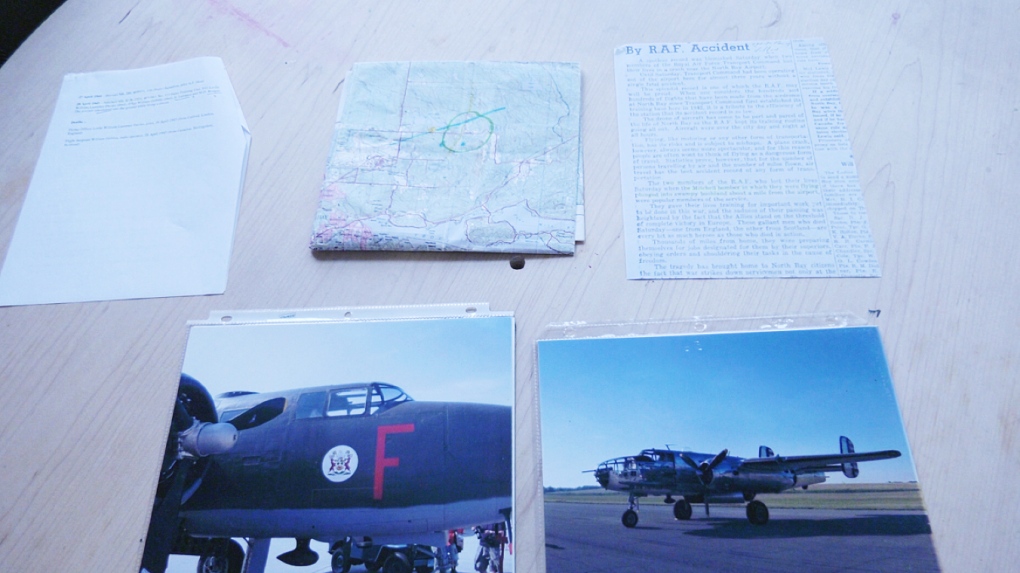 Laurence Davies was killed during a routine flight on his Mitchell bomber -- similar to the one pictured -- when it crashed on April 28, 1945, about a mile north of the airfield in a heavily wooded area. (Eric Taschner/CTV News)
Laurence Davies was killed during a routine flight on his Mitchell bomber -- similar to the one pictured -- when it crashed on April 28, 1945, about a mile north of the airfield in a heavily wooded area. (Eric Taschner/CTV News)
He died along with another British airman, Flight Sgt. William Gribbin from Scotland. It was the first fatal air crash – civilian or military – in the area.
“He died 10 days before peace was signed,” Newman said. “Before that time, there had been no crashes whatsoever.”
Local historians are still investigating the crash and why the plane went down.
While the remains of both victims were recovered and brought to a nearby road, the wreckage was never found.
“If he was doing circuits and coming back to the airport, it might have been in an area highlighted on the map,” said local historian and researcher Bob Armstrong.
Decades went by without finding the crash site. However, a new clue emerged when a piece of bomber jet debris was found in the general area near Four Mile Lake Road.
o Download our app to get local alerts on your device
o Get the latest local updates right to your inbox
Armstrong said he firmly believes it's linked to the crash since it matches the colour and model of the types of aircraft that would have been flying in that period.
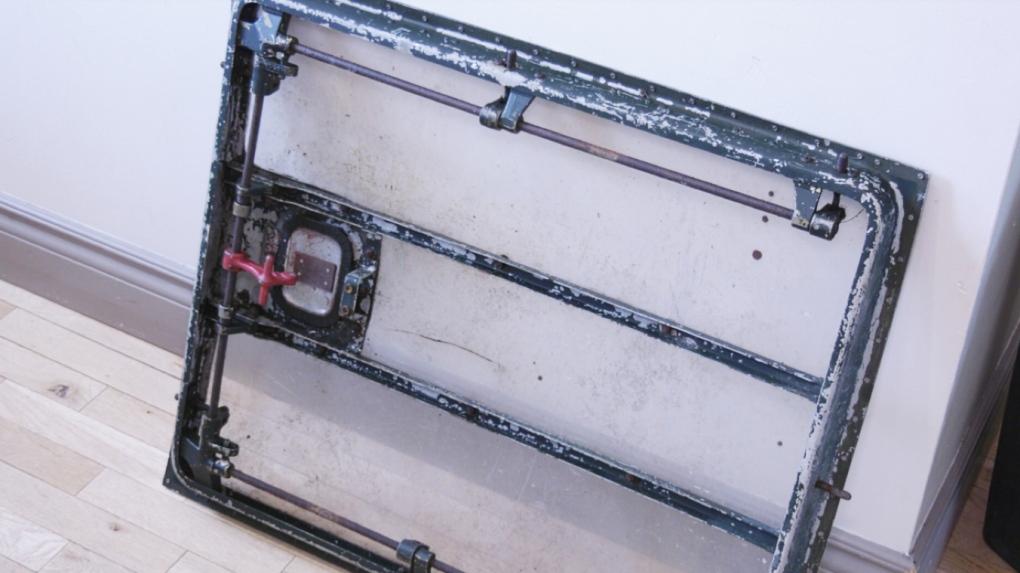 Debris believed to be from the bomber that crashed April 28, 1945. (Eric Taschner/CTV News)
Debris believed to be from the bomber that crashed April 28, 1945. (Eric Taschner/CTV News)
“We’re going to try and find more information and reach out to people and say, ‘Do you know anything or anybody that could narrow it down for us?’ We’d like to honour it,” he said.
Armstrong said the likely reason the plane crashed was due to side slip or engine failure.
For Davies, the journey to Canada has been an emotional ride. It’s one she’s proud to accomplish on behalf of her extended family all while remembering her uncle and reflecting on his role in stopping the Nazi's reign of terror.
“It’s great to share this with the people here,” she said.
CTVNews.ca Top Stories

BREAKING Prime Minister Trudeau to meet Donald Trump at Mar-a-Lago
Prime Minister Justin Trudeau has landed in West Palm Beach, Fla., on Friday evening to meet with U.S.-president elect Donald Trump, sources confirm to CTV News.
'Mayday! Mayday! Mayday!': Details emerge in Boeing 737 incident at Montreal airport
New details suggest that there were communication issues between the pilots of a charter flight and the control tower at Montreal's Mirabel airport when a Boeing 737 made an emergency landing on Wednesday.
Hit man offered $100,000 to kill Montreal crime reporter covering his trial
Political leaders and press freedom groups on Friday were left shell-shocked after Montreal news outlet La Presse revealed that a hit man had offered $100,000 to have one of its crime reporters assassinated.
Questrade lays off undisclosed number of employees
Questrade Financial Group Inc. says it has laid off an undisclosed number of employees to better fit its business strategy.
Cucumbers sold in Ontario, other provinces recalled over possible salmonella contamination
A U.S. company is recalling cucumbers sold in Ontario and other Canadian provinces due to possible salmonella contamination.
Billboard apologizes to Taylor Swift for video snafu
Billboard put together a video of some of Swift's achievements and used a clip from Kanye West's music video for the song 'Famous.'
Musk joins Trump and family for Thanksgiving at Mar-a-Lago
Elon Musk had a seat at the family table for Thanksgiving dinner at Mar-a-Lago, joining President-elect Donald Trump, Melania Trump and their 18-year-old son.
John Herdman resigns as head coach of Toronto FC
John Herdman, embroiled in the drone-spying scandal that has dogged Canada Soccer, has resigned as coach of Toronto FC.
Weekend weather: Parts of Canada could see up to 50 centimetres of snow, wind chills of -40
Winter is less than a month away, but parts of Canada are already projected to see winter-like weather.


































